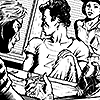‘We the Avant-Garde’. A History from Below of Dutch Heroin Use in the 1970s
DOI:
https://doi.org/10.18352/bmgn-lchr.10312Keywords:
Medical history, Netherlands, Drugs, 20th century, Nederlandse geschiedenis, Nederland, BelgiëAbstract
In the 1970s the Netherlands (like many other western countries) was shocked by a sudden wave of heroin use. The heroin ‘epidemic’ is currently framed as a public health problem that has been solved in a commendably humane fashion. In the mean time heroin users have gained a ‘loser image’. Using memoirs written by and interviews with former heroin users, this article argues that heroin use was initially linked to cultural rebellion, self-development and social criticism. We need to take this forgotten aspect of the history of the Dutch heroin ‘epidemic’ into account when we try to explain this historical phenomenon.
This article is part of the special issue 'Blurring Boundaries: Towards a Medical History of the Twentieth Century'.
‘Wij de avant-garde’. Een history from below van heroïnegebruik in Nederland in de jaren zeventig
In de jaren zeventig van de vorige eeuw werd Nederland (net als veel andere westerse landen) opgeschrikt door een plotselinge golf van heroïnegebruik. Deze ‘heroïne-epidemie’ wordt momenteel beschouwd als volksgezondheidsprobleem dat succesvol is bedwongen, op een bewonderenswaardig humane wijze. Ondertussen hebben heroïnegebruikers een ‘loser’ imago gekregen. Op basis van memoires geschreven door en interviews met voormalige heroïnegebruikers, betoogt dit artikel dat het gebruik van heroïne oorspronkelijk verbonden was met culturele rebellie, zelfontplooiing en cultuurkritiek. Dit vergeten aspect van de ‘epidemie’ is onderdeel van de verklaring voor de populariteit van opiaten destijds.
Dit artikel maakt deel uit van het themanummer 'Blurring Boundaries: Towards a Medical History of the Twentieth Century'.
Downloads

Published
Issue
Section
License
Authors who publish with this journal agree to the following terms:
a) Authors retain copyright and grant the journal right of first publication with the work simultaneously licensed under a Creative Commons Attribution 4.0 International (CC BY 4.0) that allows others to share the work with an acknowledgement of the work's authorship and initial publication in this journal.
b) Authors are able to enter into separate, additional contractual arrangements for the non-exclusive distribution of the journal's published version of the work (e.g., post it to an institutional repository or publish it in a book), with an acknowledgement of its initial publication in this journal.
c) Authors are permitted to post their work online (e.g., in institutional repositories or on their website) prior to and during the submission process.
Authors are explicitly encouraged to deposit their published article in their institutional repository.











